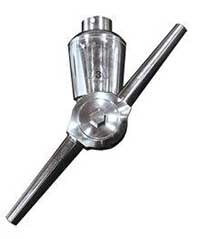Washing and Spraying Systems Vital to Food Safety
In the past, it was common practice for overall-wearing food plant workers to climb into large production tanks with hoses, brooms, spray nozzles, scrapers and the like, and sanitize them between production runs. The industry term for this was “confined space entry.”
Although this scenario still occurs, most modern food plants now use the latest automated spraying and washing technology. And there are many systems available — mainly spray balls and advanced stationary nozzles — to meet every possible need.
The Problem: Dirty, Dangerous Work
The risks associated with confined-space entry center on spray rods that spurt water at 2,000 to 2,500 psi, creating a dangerous situation for workers stationed close to the surface they’re trying to clean. Sharp agitators at the bottom of large tanks can also cause injury if workers step or fall on them.
Because of these risks, government rules — including those enacted by the U.S. EPA (Environmental Protection Agency) and under that country’s OSHA (Occupational Safety and Health Act) — require that at least three people be engaged in any confined-space cleaning operation: one to operate the pump, another to stand at the entrance to the tank and the third to get inside and perform the cleaning.
Another manual method of cleaning tanks is called a “boil out” — akin to using boiling water to clean a heavily soiled pot in the kitchen. Hot water is combined with caustics and circulated for a full eight-hour shift. It is an inefficient and time-consuming process, however, especially if the cleaning process has to be repeated.
The Solution: Effective, Automated Innovations
It’s no surprise, then, that the food industry has come up with more effective automated solutions that reduce labor and overall costs and increase repeatability, effectiveness and food safety.
The first innovation was a static spray ball, which is strategically positioned inside production tanks and shoots water at high pressure throughout the tank to remove soils. There are many static spray balls on the market and in use throughout the food and beverage industries.
Static spray balls work well for light soils, but for heavier ones — such as baked tomato residues, sauces, chocolate and other viscous products — a different solution is needed. A rotating spray ball that moves up, down and sideways in every direction at varying pressures is used to clean more heavily soiled tanks. It also cuts cycle times from several hours to 20 minutes or less, reducing plant downtime and greatly increasing productivity and guaranteeing equipment hygiene. Rotating spray balls are the most common impingement machines in use today.
Many companies now manufacture a wide array of spray balls and other washing and spraying systems, such as individual nozzles and integrated spray bars or manifolds, for cleaning tanks ranging in size from 1 liter to 15,000 liters or more. These companies also provide systems that can clean food residues baked onto fryers, bakers, totes, carriers and other units. The companies include Gamajet (part of the Alfa Laval Group), Lechler, BETE Fog Nozzle Inc., Spraying Systems Co., Douglas Machines Corp. and others.
Some companies also offer spray balls and nozzles that are 3-A rated, the highest sanitary designation in the industry. 3-A Safety Standards, Inc., which was originally set up by the dairy industry, provides this certification. It recognizes design and materials that minimize or eliminate bacteria buildup.
The spraying and washing technology used in food plants is a critical component of ensuring both food safety and the safety of workers. Today’s systems are effective, robust and an important support to food safety requirements and programs outlined in GFSI (the Global Food Safety Initiative) auditing schemes.
About the Author
Jaan Koel is Principal of Koel Communications and is a regular contributor to GFSR. He worked as Corporate Communications Manager for Tetra Pak Canada and Tetra Pak International for 25 years, and has written extensively about packaging, food processing and food safety in a variety of North American and international magazines. He is also a 2013 ASBPE silver award winner for editorial excellence.
To have more articles like this emailed to your inbox, become a GFSR Member today!

-
 FeaturedRisk management
The Cost of a Breach: What a Cyberattack Could Mean for Food Safety Recalls
FeaturedRisk management
The Cost of a Breach: What a Cyberattack Could Mean for Food Safety Recalls
-
 FeaturedRisk management
Securing the Food Chain: How ISO/IEC 27001 Strengthens Cybersecurity
FeaturedRisk management
Securing the Food Chain: How ISO/IEC 27001 Strengthens Cybersecurity
-
 FeaturedRisk management
Revolutionizing Food Safety Training: Breaking Out of the “Check-the-Box” Mentality
FeaturedRisk management
Revolutionizing Food Safety Training: Breaking Out of the “Check-the-Box” Mentality
-
 GFSI Standards
GFSI 2025: Building Trust, Tech-Forward Solutions, and Global Unity in Food Safety
GFSI Standards
GFSI 2025: Building Trust, Tech-Forward Solutions, and Global Unity in Food Safety
-
 FeaturedFood Safety
Integrated Pest Management: Strategies to Protect Your Brand’s Reputation
FeaturedFood Safety
Integrated Pest Management: Strategies to Protect Your Brand’s Reputation
-
 FeaturedFood Safety Culture & Training
No Open Door Policy: Challenges That Impact Pest Control in Food Processing Plants
FeaturedFood Safety Culture & Training
No Open Door Policy: Challenges That Impact Pest Control in Food Processing Plants




